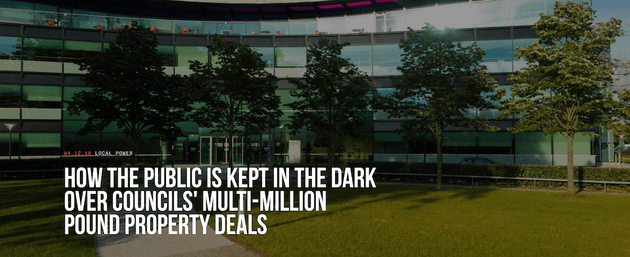
Treasury bans billion-pound council property investments revealed by the Bureau
Local authorities are to be banned by the Treasury from investing in commercial property such as offices and shopping centres.
The practice is being reviewed as part of a consultation into the role of the Public Works Loan Board, which some local authorities have used as an easily accessible source of financing for their property sprees.
While the consultation is not due to finish until July, the Treasury said on Wednesday that it wanted to see an end to the investments – which have resulted in some local authorities becoming dependent on rental income to fund services.
A spokesman said: “Our starting point is that local authorities should invest public money in regeneration, housing and delivering services, not in speculative commercial investments which can put local and national taxpayers at risk.”
Over the past two years the Bureau’s investigations have repeatedly raised the issue of local authority investments, including being mentioned prominently in a select committee inquiry and prompting an investigation into the topic by the National Audit Office (NAO). In a story published alongside The Times on Saturday we reported the investments had been “battered” by the coronavirus crisis, after shops and offices were closed due to the lockdown.
Since 2010, government funding for councils has been halved, with £15bn lost to cuts. As revealed by the Bureau, the number of councils investing in property doubled in the space of two years. A recent report by the NAO said councils had spent £6.6bn on commercial property since the end of March 2016. Across the country, council services – many of which are now on the frontline of the battle against Covid-19 – have been tied to the vagaries of the property market.
Some councils are heavily dependent on income from property investments to provide services. Woking borough council in Surrey reported a month before lockdown that its investment and rental income was the equivalent of 88% of its budget for services. Next year that figure was predicted to rise to 98%.


Since the end of March 2016 the council has spent £206m on 12 commercial properties. It also has pre-existing interests in two shopping centres. The purchases were financed through borrowing. While the council has been making a reasonably healthy net profit, it predicted this would narrow significantly in the coming years – and that was before the effects of coronavirus were known.
Reserves are in place to cope with temporary falls in rental income but “should there be a significant permanent reduction in income, service provision would need to be reviewed”, the council’s report said.
Woking’s finance director Leigh Clarke told the Bureau: “It’s too early to assess the long-term impact of the coronavirus, but it is reasonable to assume the world will be a different place after this crisis.”
The outlook looks particularly bleak for councils that have invested in retail. The sector was already struggling before the lockdown led to the closure of all but essential shops. Despite government support schemes, a recent study suggests a prolonged lockdown could wipe out half of the market. The NAO found more than a third of councils’ spending on property in the past three years, up to £2.3bn, had been in the retail sector.
Gloucester council used all of the £862,000 it raised from investments in 2019-20 – half of which relates to the retail sector – to fund services. It has so far only collected a quarter of the rent owed for April to June.
Spelthorne borough council, which was highlighted in a Bureau investigation, invested in retail property only weeks before lockdown. In February it announced the purchase of the Elmsleigh shopping centre in Staines-upon-Thames for a reported £40m. Now more than 90% of the stores are closed. The scale of the Spelthorne’s investments means it has become “heavily reliant on investment income” to fund services. Its portfolio was predicted to bring in £9.9m this year – more than council tax and dwarfing business rates and government grants.
Spelthorne did not respond to questions about its investments and rental income, but did say it had “positioned itself to withstand any adverse impacts on its commercial rent [to] ensure there is no impact on the income stream supporting the council’s services”.
The government has provided more than £3bn to keep councils going through the pandemic but one council leader told the committee up to four times more could be needed. Moreover, this funding is not meant to cover losses from commercial investment.
At the Public Accounts committee hearing Rob Whiteman, chief executive of Chartered Institute of Public Finance and Accountancy, openly criticised Spelthorne council. “Spelthorne borrowed too much,” he said. The council borrowed almost 50 times its annual budget to fund its property spree. “You don't have to be Accountant of the Year to know that's quite a lot of risk.”
The Bureau newsletter
Subscribe to the Bureau newsletter, and hear when our next story breaks.
Our reporting on local power is part of our Bureau Local project, which has many funders. None of our funders have any influence over the Bureau’s editorial decisions or output.
Header image: A deserted shopping centre. Credit: Ross Hall via Flickr, released under Creative Commons 2.0




